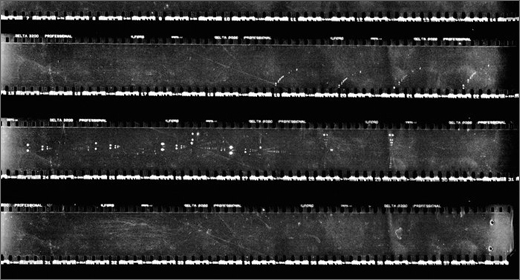Fading time-stretched tunes, recursive arcs and dives unravel in a flux of melodic micro-variations, self-cannibalizing loops succumbing happily to the hiss, run through by fraying threads of saturated tonalities.
 Andrew Hargreaves has acquired a certain caché as a musical practitioner of distinction, chiefly as one of the captains of The much-feted Boats. But his own Tape Loop Orchestra is arguably the more intriguing project. Following on 2009’s 1953 Culture Festival, the home listening ambient-drone post-classical community has been slowly drawn in, as if by some slow-moving grainy old European art-house movie, by successive episodes of TLO’s crumbling lowlight symphonies. The latest, In a Lonely Place, is inspired by an eponymous Nicholas Ray film noir starring Humphrey Bogart with Ray’s then-wife, Gloria Grahame (when their relationship was at breaking point). Based on a Dorothy B. Hughes novel, the most striking feature is a fictional mirroring of real life events, the Gloria Grahame character here breaking up a relationship with the screenwriter played by Humphrey Bogart, whose mood-swinging temperament arouses her fear, distrust and suspicion.
Andrew Hargreaves has acquired a certain caché as a musical practitioner of distinction, chiefly as one of the captains of The much-feted Boats. But his own Tape Loop Orchestra is arguably the more intriguing project. Following on 2009’s 1953 Culture Festival, the home listening ambient-drone post-classical community has been slowly drawn in, as if by some slow-moving grainy old European art-house movie, by successive episodes of TLO’s crumbling lowlight symphonies. The latest, In a Lonely Place, is inspired by an eponymous Nicholas Ray film noir starring Humphrey Bogart with Ray’s then-wife, Gloria Grahame (when their relationship was at breaking point). Based on a Dorothy B. Hughes novel, the most striking feature is a fictional mirroring of real life events, the Gloria Grahame character here breaking up a relationship with the screenwriter played by Humphrey Bogart, whose mood-swinging temperament arouses her fear, distrust and suspicion.
It’s a first vinyl release for Facture, in-house label of Fluid Radio, to whom Hargreaves confessed his noir habit, the shadowy allure of its shifting balance between glamour and dark underbelly, its themes of ‘good’ people pulled down into dark undertow. A perfect fit with TLO’s pet theme of decay, then, concept and music meaningfully meshed, semiosis activated by compositional strategy: a film about a film maker’s disintegration – both Bogart’s character and Ray himsel—reflected by music in parallel decline. A slow shift and degeneration sees spectral vestiges of muffled melody, mimetic of the classic noir dynamic of slow barely perceptible change: setting out with a certain focus, albeit blurred, tracks undergo a breakdown, crumbling into faded phrase-revenants, echoing the film’s ‘dive from romantic optimism into malevolent violence.’ The three pieces take their titles from an iconic line of dialogue spoken by Bogart’s character, and seen on a typewritten page in an end-of-movie scene. The elegiac “I Was Born When She Kissed Me” begins ominously, mood-shifting to softer but sombre swells. “I Died When She Left Me” has heart-rending slow-motion strings and bowed xylophone eventually effaced in a thickening veil of hiss and saturation. On “I Lived A Few Weeks While She Loved Me” loops of ever-fuzzier cadences resound dolefully in Gas-eous grain and Basinski-an blur. Living up to the project name, the residue of the magnetic spools of the sounds’ capture proves, metaphorically, a substantial ingredient in the dish rather than mere garnish. TLO’s signature recording and editing methods result in pieces of antiqued drift, bearing strange cargo via brooding degrading faltering strings, eponymous devices and their carriers seeping into their sounds.
Overall, it makes for a work freighted with narratives—of loss and abandonment, of a certain ambiguity. Themes echo classic era noir, sliding into ‘a descent from glittering surface tension to sinister murky depth’ with poignant echoes of the ‘dive from romantic optimism into malevolent violence,’ this, naturally, sublimated. Fading time-stretched tunes, recursive arcs and dives unravel in a flux of melodic micro-variations, self-cannibalizing loops succumbing happily to the hiss, run through by fraying threads of saturated tonalities. A keen aesthetic sensibility is sustained throughout the whole package, with art and design from fellow Boats-man, Craig Tattersall et al., and conceptual curation by Dan Crossley (Fluid Radio/Facture).
In A Lonely Place is available on Facture [Release page]


















![Pole :: Tempus Remixes (Mute) — [concise]](https://igloomag.com/wp/wp-content/uploads/2025/04/pole-tempus-remixes_feat-75x75.jpg)






![Hasbeen :: Bunker Symphonies II (Clean Error) — [concise]](https://igloomag.com/wp/wp-content/uploads/2025/04/hasbeen-bunker-symphonies-ii_feat-75x75.jpg)

